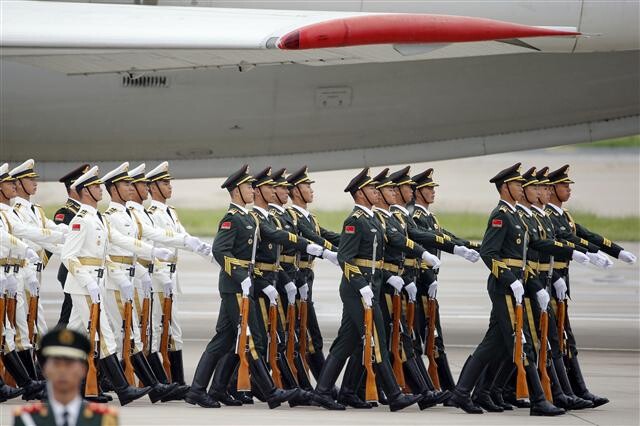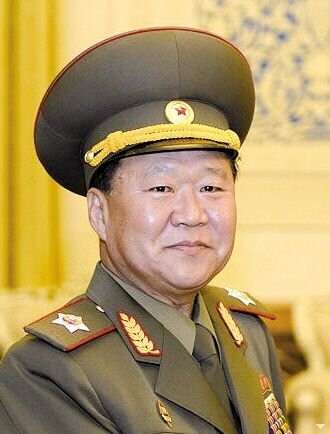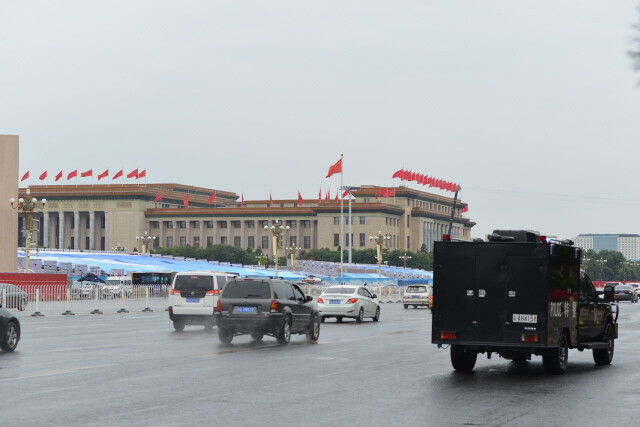hankyoreh
Links to other country sites 다른 나라 사이트 링크
Beijing military parade a barometer for cooling China-N. Korea relations

A military parade in Beijing on Sept. 3 to celebrate the seventieth anniversary of China’s victory over Japan and fascism in the Second World War is shaping into a test of the future direction for North Korea and China’s cooling relations.
The representative sent by Pyongyang to the parade is Choe Ryong-hae, secretary of the Workers’ Party, rather than leader Kim Jong-un. Choe previously visited China and met with Chinese President Xi Jinping as Kim’s special envoy in May 2013.
Another factor in his selection may be the fact that Choe’s father was Choe Hyon, who fought alongside Kim’s grandfather Kim Il-sung as a member of the Chinese Communist Party-affiliated Northeast Anti-Japanese United Army in the 1930s. The choice may be interpreted as an attempt to play up North Korea and China’s past relationship as confederates in the war against Japan.
“The Northeast Anti-Japanese United Army is also taking part in the review,” noted a Chinese expert on Korean Peninsula affairs.

“As it happens, Choe is essentially reviewing the same unit that his father was a part of, while President Park Geun-hye will be inspecting the unit that Kim Il-sung belonged to,” the expert added.
China also categorized Choe in a group of 30 head of state-level foreign guests, despite him not being a head of state himself. No senior-level exchanges have taken place between China and North Korea since North Korea visits in Feb. and Mar. 2014 by Chinese vice minister of foreign affairs Liu Zhenmin and special representative for Korean Peninsula affairs Wu Dawei, respectively.
Experts said that while Choe’s visit may help in resuming official interactions between Pyongyang and Beijing, it is unlikely to bring about any historic changes.
“In terms of job title, Choe Ryong-hae ranks below the nominal head of state, Supreme People’s Assembly presidium president Kim Yong-nam, but he‘s also a close associate of Kim Jong-un who has served as a special envoy in the past,” noted Peking University professor Jin Jingyi.
“This may be a sign of North Korea’s commitment to trying to improve relations with China,” Jin said.
Renmin University of China professor Shi Yinhong agreed that Choe‘s visit “shows North Korea is trying somewhat to reduce the chill with China.”
“But trust in North Korea-China relations is at an all-time-low right now, and there’s no sign of a change in attitudes on the nuclear issue,” Shi added. “This military parade visit won’t be enough to improve relations.”
Another foreign affairs source said Choe was “unlikely” to meet separately with President Xi Jinping during his visit.

By Seong Yeon-cheol, Beijing correspondent
Please direct questions or comments to [english@hani.co.kr]

Editorial・opinion
![[Correspondent’s column] The real reason the US is worried about Chinese ‘overcapacity’ [Correspondent’s column] The real reason the US is worried about Chinese ‘overcapacity’](https://flexible.img.hani.co.kr/flexible/normal/500/300/imgdb/original/2024/0510/5217153290112576.jpg) [Correspondent’s column] The real reason the US is worried about Chinese ‘overcapacity’
[Correspondent’s column] The real reason the US is worried about Chinese ‘overcapacity’![[Editorial] Yoon’s gesture at communication only highlights his reluctance to change [Editorial] Yoon’s gesture at communication only highlights his reluctance to change](https://flexible.img.hani.co.kr/flexible/normal/500/300/imgdb/original/2024/0510/7717153284590168.jpg) [Editorial] Yoon’s gesture at communication only highlights his reluctance to change
[Editorial] Yoon’s gesture at communication only highlights his reluctance to change- [Editorial] Perilous stakes of Trump’s rhetoric around US troop pullout from Korea
- [Guest essay] Preventing Korean Peninsula from becoming front line of new cold war
- [Column] The state is back — but is it in business?
- [Column] Life on our Trisolaris
- [Editorial] Penalties for airing allegations against Korea’s first lady endanger free press
- [Editorial] Yoon must halt procurement of SM-3 interceptor missiles
- [Guest essay] Maybe Korea’s rapid population decline is an opportunity, not a crisis
- [Column] Can Yoon steer diplomacy with Russia, China back on track?
Most viewed articles
- 1[Correspondent’s column] The real reason the US is worried about Chinese ‘overcapacity’
- 2[Editorial] Yoon’s gesture at communication only highlights his reluctance to change
- 3Yoon rejects calls for special counsel probes into Marine’s death, first lady in long-awaited presse
- 4Korea likely to shave off 1 trillion won from Indonesia’s KF-21 contribution price tag
- 5[Book review] Who said Asians can’t make some good trouble?
- 6Nuclear South Korea? The hidden implication of hints at US troop withdrawal
- 7[Column] “Hoesik” as ritual of hierarchical obedience
- 8Young Koreans vent rage over working hours already all too grueling
- 9When and why did Koreans go from anti-American to pro-US?
- 10Birth of Jesus in Korea